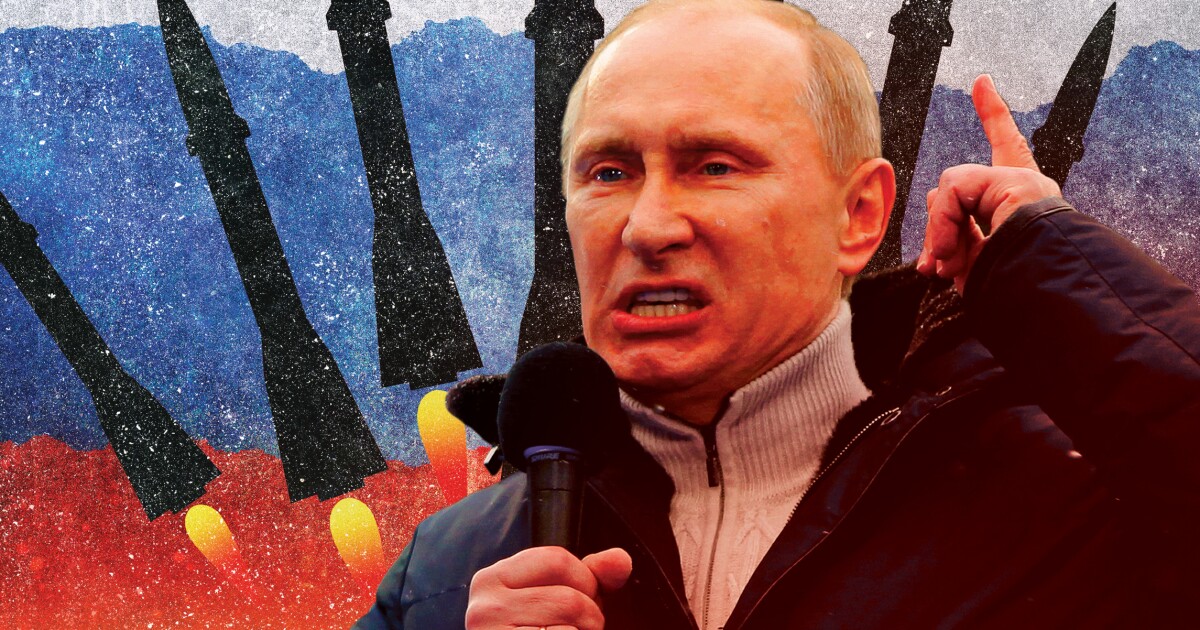

In the months leading up to his 2016 election as president, Donald Trump reportedly asked an adviser what some people considered a dumb question: “Why can’t the U.S. use nuclear weapons?”
His campaign denied the account, presumably because it might make him seem naive. But the fact is the question is at the very heart of nuclear deterrence theory, posed more artfully as “What good are nuclear weapons if you can’t use them?”
EX-HOUSE INTEL CHAIRMAN MIKE ROGERS LAUNCHES RUN FOR SENATE IN MICHIGAN
It’s a question that has, no doubt, bedeviled Russian President Vladimir Putin as he has sought to use his formidable nuclear arsenal to deter the United States and its Western allies from arming Ukraine and thwarting his irredentist ambitions.
Even before Russia’s February 2021 invasion of Ukraine, Putin has dangled the threat of the nuclear weapons under the Kremlin’s declared military doctrine of “escalate to de-escalate” to try to intimidate the U.S. and NATO.
The doctrine envisions the use of small tactical nuclear weapons to shock an adversary into surrendering on terms favorable to Moscow in order to ostensibly avert an all-out nuclear war.
President Joe Biden took the risk seriously at the outset of the war, limiting U.S. aid to Ukraine to “defensive” weapons that came with restrictions that they be used only on Ukrainian territory so as not to draw NATO into World War III with Russia.
On the day Russian troops invaded Ukraine, Putin rattled his nuclear saber, warning, “No matter who tries to stand in our way … they must know that Russia will respond immediately, and the consequences will be such as you have never seen in your entire history.”
But as the war stretched into its second year and Russia’s battlefield fortunes began to fade, so did Putin’s red lines, slowly turning pink before disappearing altogether.
So far Putin’s nuclear threats have been revealed to be hollow, largely because, for all their fearsome power, nuclear weapons are of little use in a conventional shooting war.
“Nuclear weapons are the ultimate paper tiger,” says longtime arms control advocate Joe Cirincione, former president of the Ploughshares Fund.
“The U.S. nuclear arsenal did not deter Putin from invading Ukraine, but Putin‘s nuclear weapons do deter us from kicking him out of that country. They don’t deter aggression, they enable it,” Cirincione argues. “U.S. and NATO forces could destroy Russia’s occupying army in a matter of days. We do not do so because Putin threatens to use nuclear weapons.”
But while nuclear weapons may not have given Russia a decisive edge — they didn’t scare Ukraine into surrender, or dissuade the U.S. and its allies from arming Ukrainian forces to the teeth — Putin’s nuclear coercion has affected the course of the war in subtle, not always obvious ways, says Hal Brands, a senior fellow at the American Enterprise Institute.
“Without nuclear weapons and nuclear threats, Russia might well have lost the war by now. And without the backing of a U.S. nuclear arsenal harnessed to the security of Washington’s allies, Ukraine might have lost, because Russia could have more brutally coerced the countries whose aid is keeping Kyiv alive,” Brands writes in an opinion essay for Bloomberg.
Brands poses the question, what if Biden had called Putin’s bluff at the beginning of the war?
“In March 2022, Russian forces were stuck outside of Kyiv. The application of Western airpower would have devastated Putin’s overextended army. Putin’s only real recourse would have been limited nuclear strikes against targets in Ukraine or NATO countries in Eastern Europe,” he writes.
“Perhaps Putin would have chosen this option. Or perhaps he would have decided that losing a conventional war was better than starting a nuclear one. It’s hard to know what the U.S. should have done in this instance for the same reason nuclear statecraft is always vexing: It requires us to climb inside the heads of our opponents and guess what they will do when the decisive moment comes, knowing that the price of guessing wrong could be utter catastrophe.”
Writing in the Daily Beast earlier this year, Cirincione argued the risk of Putin resorting to nuclear warfare is waning by the day because of the clear threat that NATO would respond with massive conventional force, and because Putin is losing slowly.
“It has become clearer that Putin is highly unlikely to ever use nuclear weapons in his war,” writes Cirincione. “It is very hard, even for Putin, to justify exploding nuclear weapons over a slow, grinding defeat. Like a frog who sits in a pot of water heating slowly, Putin doesn’t feel any point at which he must make a nuclear leap.”
Cirincione argues a Ukrainian victory would send a powerful message that empty nuclear threats “do not force a nation to comply or collapse,” and that “nuclear weapons are nearly useless, all risk, and little benefit.”
“While understandable in the first few months of Putin‘s war, this fear [of nuclear weapons use] is now misplaced. We could be providing Ukraine with the weapons it needs, like ATACMs, without risking the use of nuclear weapons,” he says. “Biden has been understandably careful in the aid that we provide the Ukrainians, but he has been too cautious. We have to adjust.”
But Brands, co-author of Danger Zone: The Coming Conflict with China, says one of the most important questions raised by the current war in Ukraine is what Chinese President Xi Jinping makes of it.
CLICK HERE TO READ MORE FROM THE WASHINGTON EXAMINER
“Maybe Xi has been impressed by the cohesion of the West and the subpar performance of an autocratic military — lessons that would reinforce the peace in the Taiwan Strait. Or maybe he has learned something different: That America won’t fight even a conventional war against a nuclear-armed rival,” he writes.
“Nuclear statecraft is replete with ironies,” Brands says. “One of them is that deterring a future war in the Western Pacific may require convincing China not to draw too many conclusions from the current war in Ukraine.”





